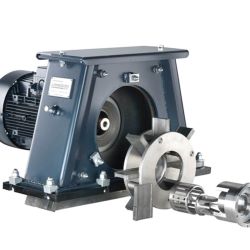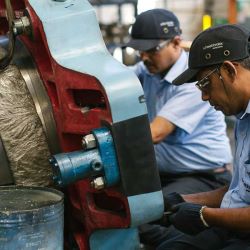Intensive TLC
Tilghman and Spencer Halstead are Wheelabrator legacy brands, so Wheelabrator Plus had occasionally supplied rare spare parts, and were of course familiar with the equipment. The team around Mark Abley serviced and fixed the four machines – and discussed the ongoing issues with the equipment with Jake.
Mark looks back on the initial meetings with Titan: “Jake and his team knew there had to be a better way of keeping their shot blast equipment on track. They also had a vision of how it might work, but were lacking the partner who could deliver it with them. Not every generalist service engineer knows his way around a blast machine, yet understanding the equipment inside out is key to pro-active maintenance. That’s what Wheelabrator Plus brought to the table – what we took away was a unique partnership approach, made possible by a customer with a very sophisticated attitude to maintenance.”
Together with Jake’s team, Wheelabrator Plus developed a preventative maintenance programme that went on to revolutionise operations at Titan. But first, they had to convince the production and maintenance teams, says Jake: “When we knew what needed doing, we needed to find the time to do it. Luckily, the fact that we were able to quantify the losses helped in convincing maintenance and production. We struck a deal: if they could give me one day to let the Wheelabrator Plus guys service and fix the machines, they would get 75 hours additional uptime in exchange. That convinced them.”
Delivered to a set schedule by two Wheelabrator engineers, the programme gives intensive attention to all four machines, in rotation. Each machine is inspected every four weeks on a Saturday, and then serviced three weeks later by the same engineer, who has the right parts to hand to complete the job. While one engineer is servicing, the other is inspecting another machine. Both hold some parts in stock to attend any ad-hoc issues.
Mark adds: “Jake, as well as Dave Herbert and Geoff Hickman from the maintenance team, have given us invaluable input and keep pushing us to further develop the programme. It’s a very collaborative approach, underpinned by a longer-term contract that makes commercial sense for Titan.”


